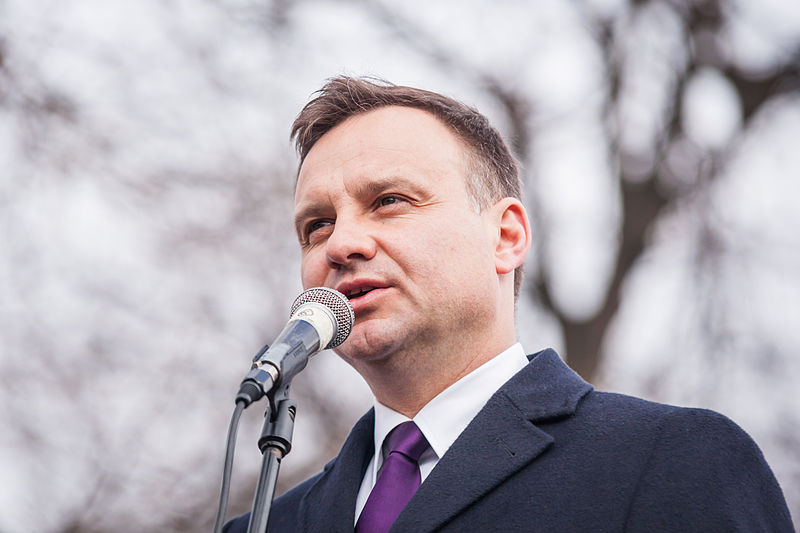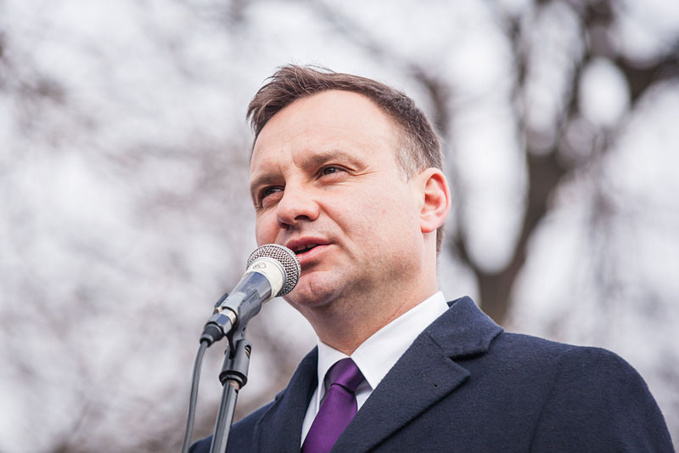The lion's share of questions concerns the internal life of Poland, but the two of them will undoubtedly be of interest to the European Commission, because they are about Warsaw's membership in a united Europe. The referendum participants will be asked to answer the question whether it is worth guaranteeing Poland's membership in the European Union in the country's Constitution. The second question concerns the supremacy between national and international law. The Poles have to decide which laws, in their opinion, are more important: Polish, that is, The Constitution of Poland, or pan-European, ie. the Charter of Fundamental Rights of the European Union.
Now, Poland is in the EU’s black book. Relations between Warsaw and the European Commission deteriorated sharply after the Conservative Party of Law and Justice (PiS) came to power in Poland almost three years ago. By the way, the party nominated Andrzej Duda, its former member, for the presidency. Now the main controversial issue is the reform of the judiciary, conducted by the ruling party. In the opinion of the European Commission, this is not less than an attack on democracy in Poland.
Andrzej Duda believes that the constitutional guarantee of Poland's membership in the European Union will strengthen its position in the union. By the way, the president also wants to invite the Poles to comment on the following question: should the Constitution guarantee the country's membership in NATO? It is also proposed to consider giving greater power to referendums and their more active application in the country’s life.
Besides, Duda has some other questions. He wants, for example, to find out what his compatriots think about expanding President's powers in Poland's foreign policy and in defense matters. His interest in the country's defense capability is understandable. The head of state often argues with Defense Minister Antoni Macierewicz on defense matters. Another question is whether it’s worth adding to the Constitution a clause Christianity in Poland.
President Duda explains the need for a referendum by the fact that the 1997 Constitution was the product of the transformation of Poland after 1989, when it returned to a market economy. The current Constitution does not take into account Poland's membership in the EU and NATO.
The issues proposed by President are not final and can be changed during the pre-discussion, which will take place before the referendum. Only after this, Andrzej Duda will formally submit a draft referendum to the Senate of Poland. If the draft is approved by the upper house of the Polish parliament, the senators will set a date for the referendum. President Duda proposes to hold it on 10 or 11 November.
The Poles have already begun to vigorously discuss the issues, although nobody is sure if it will take place at all. The matter is that the Senate is controlled by the ruling conservatives, with whom Duda has had some arguments after leaving the party. Leaders of the PiS do not hide their opinion on the referendum. Most of the high-ranking party members are cautious about President's idea. The leader of PiS, Jarosław Kaczyński, who is rightly considered the power behind the throne of present-day Poland, spoke out against referendums with low turnout.
The referendum’s date causes a lot of criticism, too. For example, Senate Speaker Stanisław Karczewski said on Monday that the Constitution is the source of many unnecessary political conflicts, but stressed that he does not want to hold a referendum on November 11, the day when Poland celebrates a great holiday, the centennial of the country's independence. Press secretary of the Law and Justice party Beata Mazurek said on Tuesday that President’s proposal is preliminary and that the party will discuss it.
source: ft.com
Now, Poland is in the EU’s black book. Relations between Warsaw and the European Commission deteriorated sharply after the Conservative Party of Law and Justice (PiS) came to power in Poland almost three years ago. By the way, the party nominated Andrzej Duda, its former member, for the presidency. Now the main controversial issue is the reform of the judiciary, conducted by the ruling party. In the opinion of the European Commission, this is not less than an attack on democracy in Poland.
Andrzej Duda believes that the constitutional guarantee of Poland's membership in the European Union will strengthen its position in the union. By the way, the president also wants to invite the Poles to comment on the following question: should the Constitution guarantee the country's membership in NATO? It is also proposed to consider giving greater power to referendums and their more active application in the country’s life.
Besides, Duda has some other questions. He wants, for example, to find out what his compatriots think about expanding President's powers in Poland's foreign policy and in defense matters. His interest in the country's defense capability is understandable. The head of state often argues with Defense Minister Antoni Macierewicz on defense matters. Another question is whether it’s worth adding to the Constitution a clause Christianity in Poland.
President Duda explains the need for a referendum by the fact that the 1997 Constitution was the product of the transformation of Poland after 1989, when it returned to a market economy. The current Constitution does not take into account Poland's membership in the EU and NATO.
The issues proposed by President are not final and can be changed during the pre-discussion, which will take place before the referendum. Only after this, Andrzej Duda will formally submit a draft referendum to the Senate of Poland. If the draft is approved by the upper house of the Polish parliament, the senators will set a date for the referendum. President Duda proposes to hold it on 10 or 11 November.
The Poles have already begun to vigorously discuss the issues, although nobody is sure if it will take place at all. The matter is that the Senate is controlled by the ruling conservatives, with whom Duda has had some arguments after leaving the party. Leaders of the PiS do not hide their opinion on the referendum. Most of the high-ranking party members are cautious about President's idea. The leader of PiS, Jarosław Kaczyński, who is rightly considered the power behind the throne of present-day Poland, spoke out against referendums with low turnout.
The referendum’s date causes a lot of criticism, too. For example, Senate Speaker Stanisław Karczewski said on Monday that the Constitution is the source of many unnecessary political conflicts, but stressed that he does not want to hold a referendum on November 11, the day when Poland celebrates a great holiday, the centennial of the country's independence. Press secretary of the Law and Justice party Beata Mazurek said on Tuesday that President’s proposal is preliminary and that the party will discuss it.
source: ft.com



















